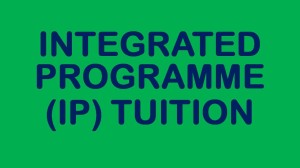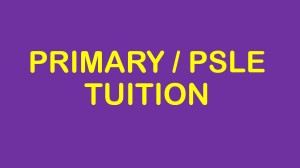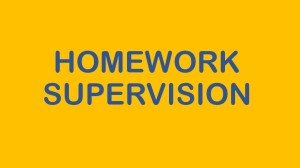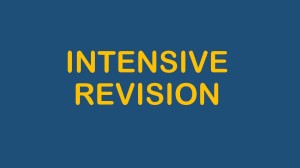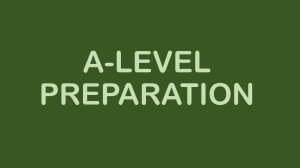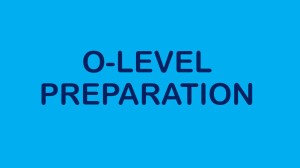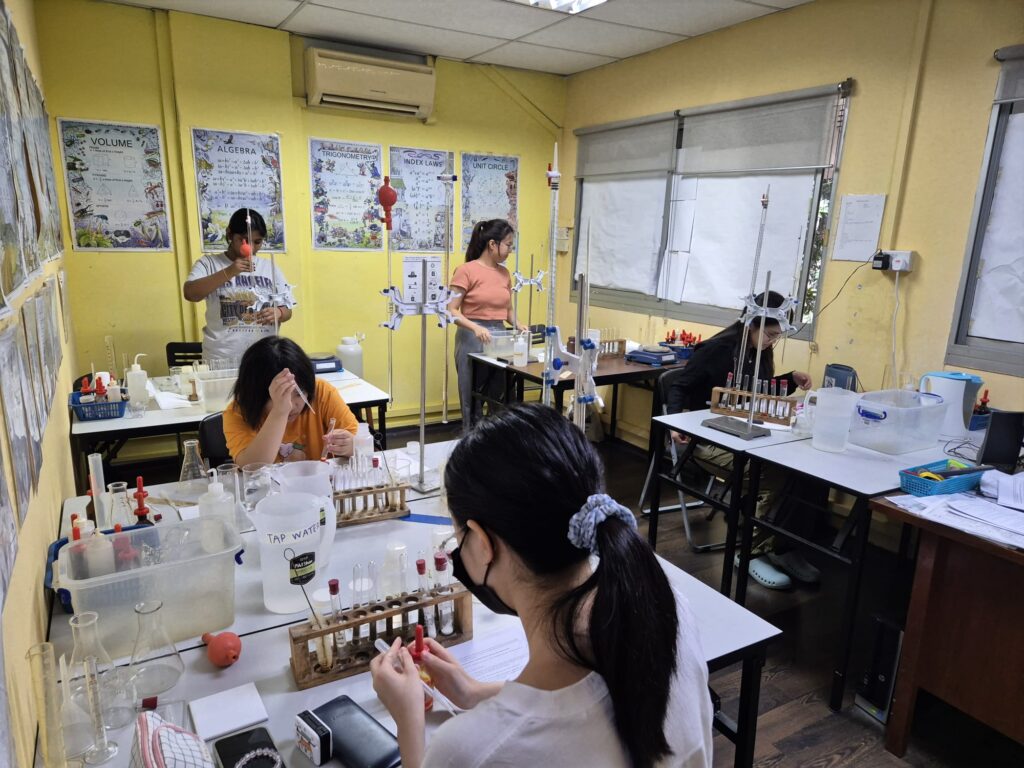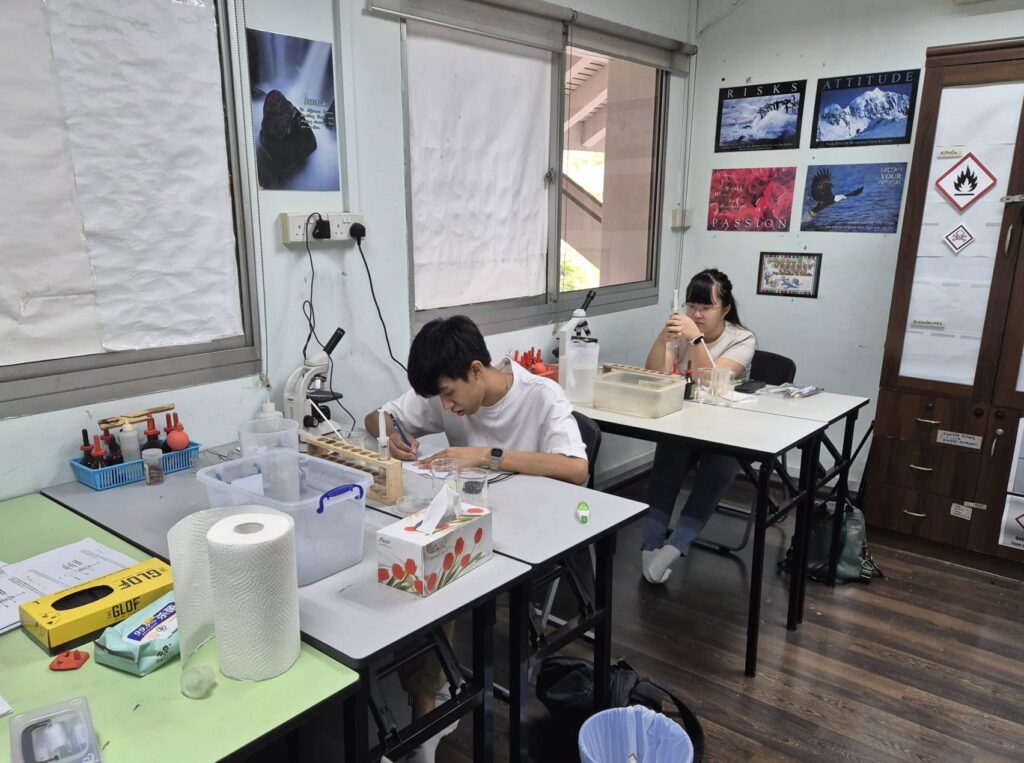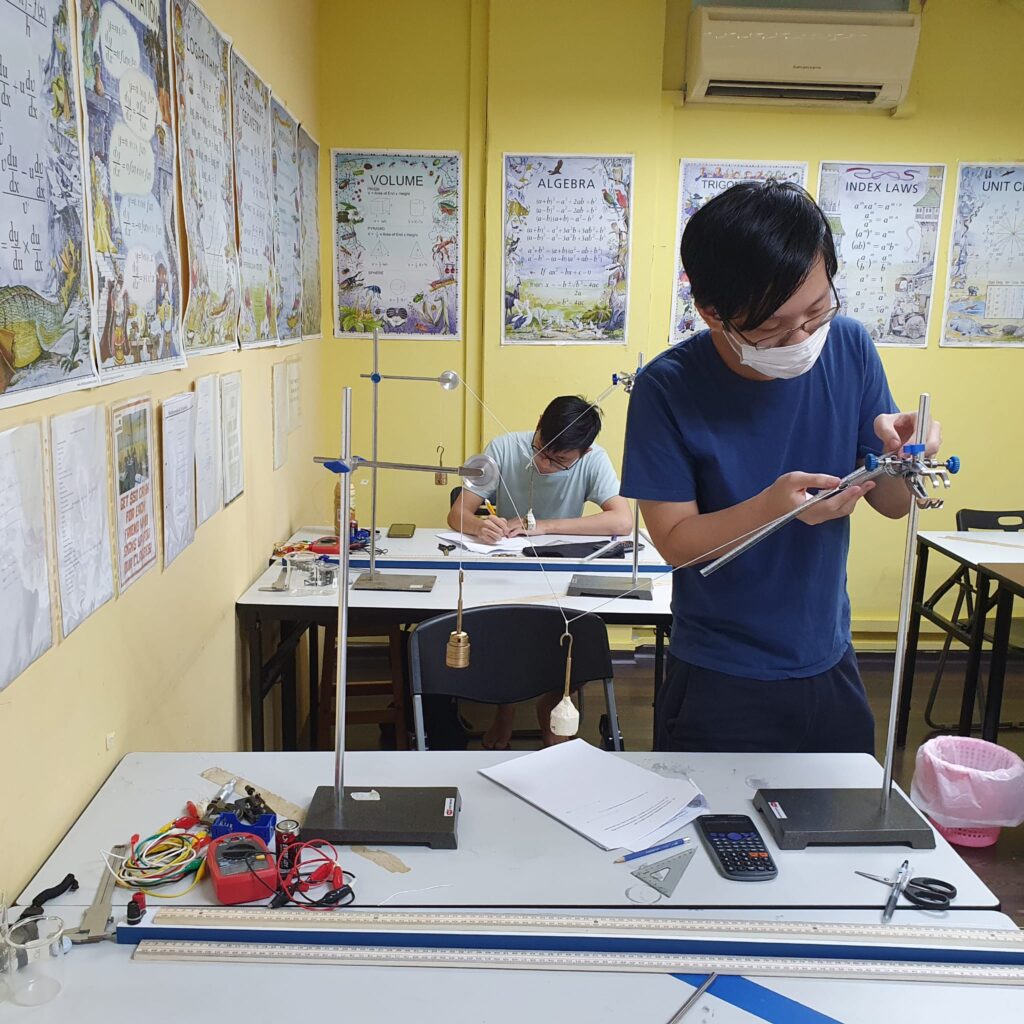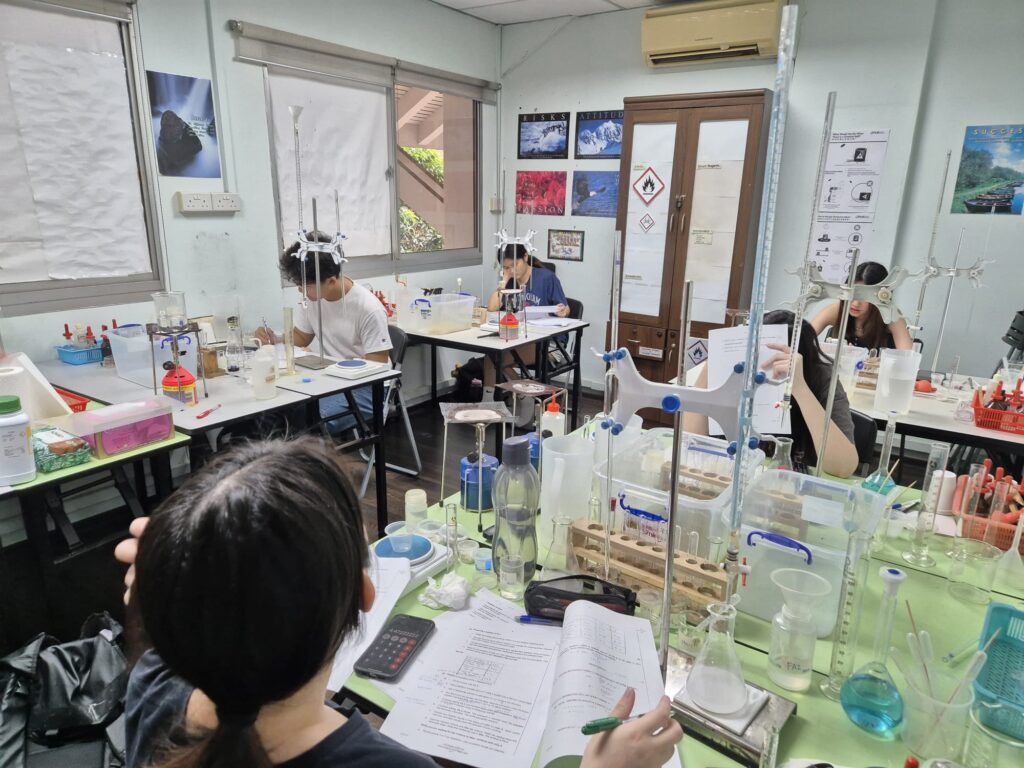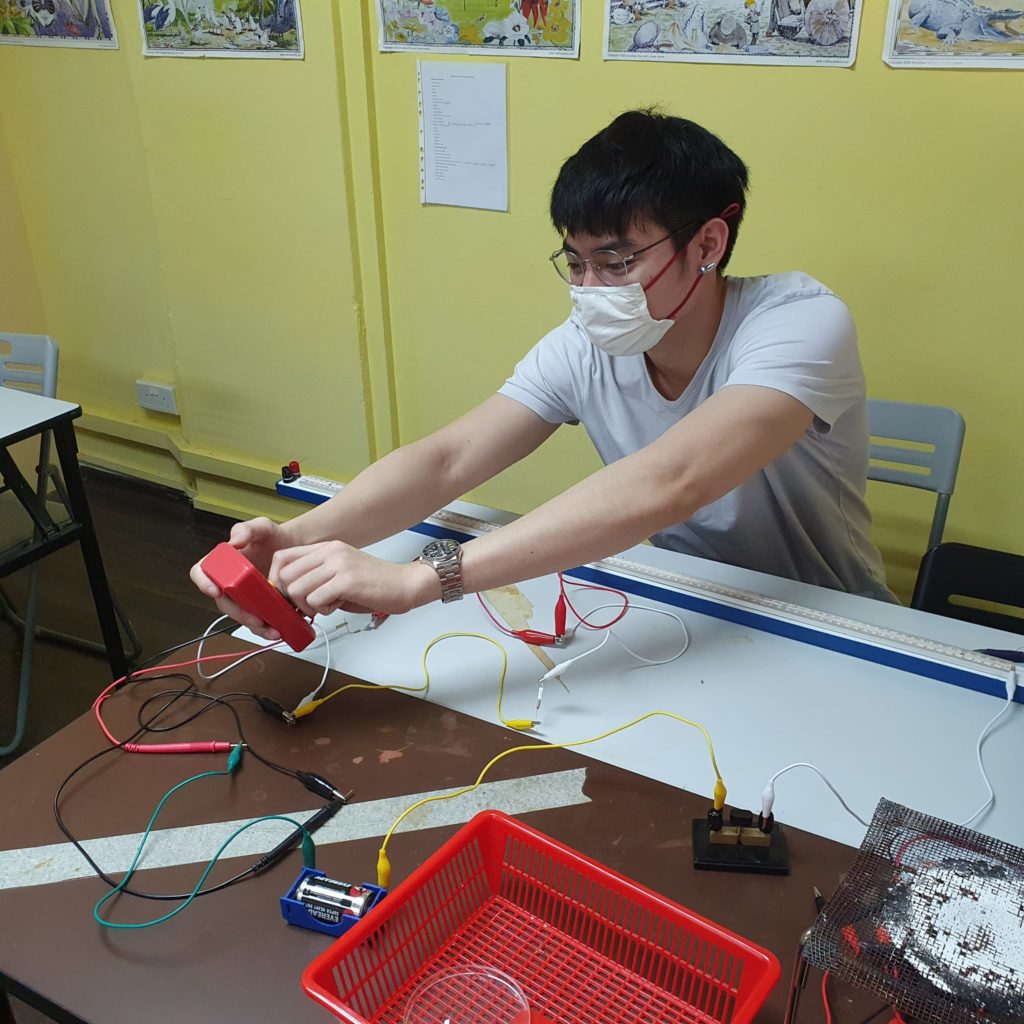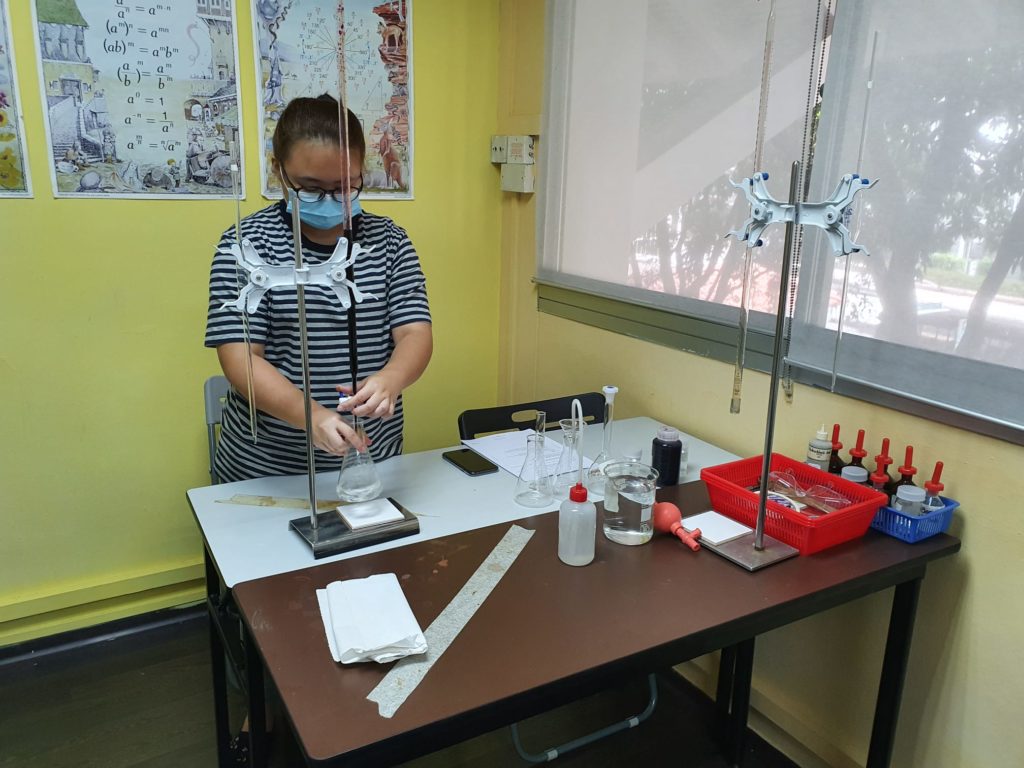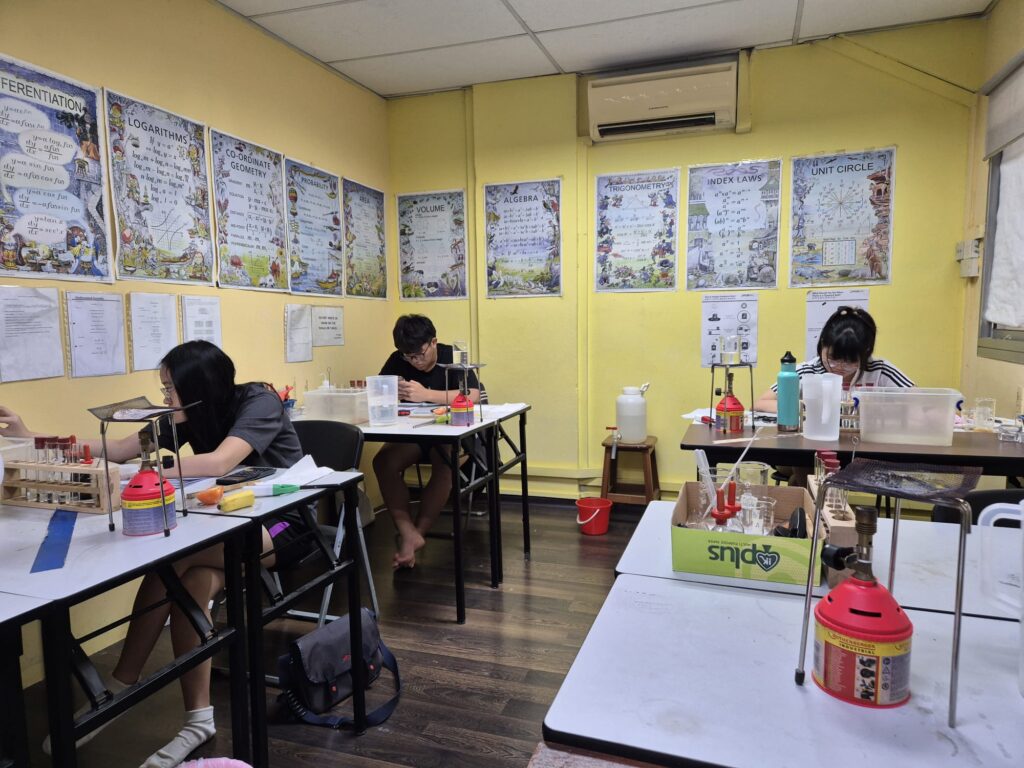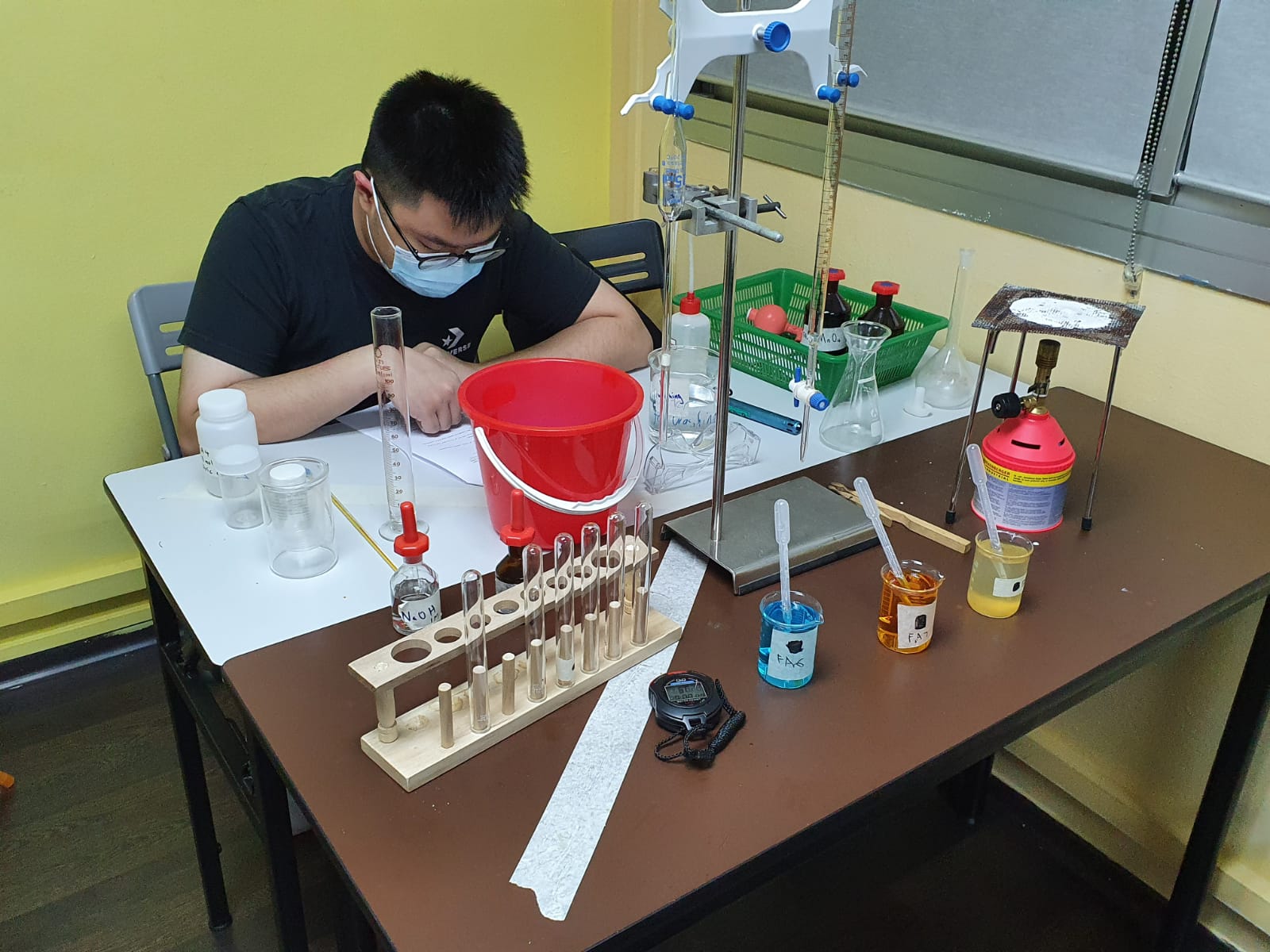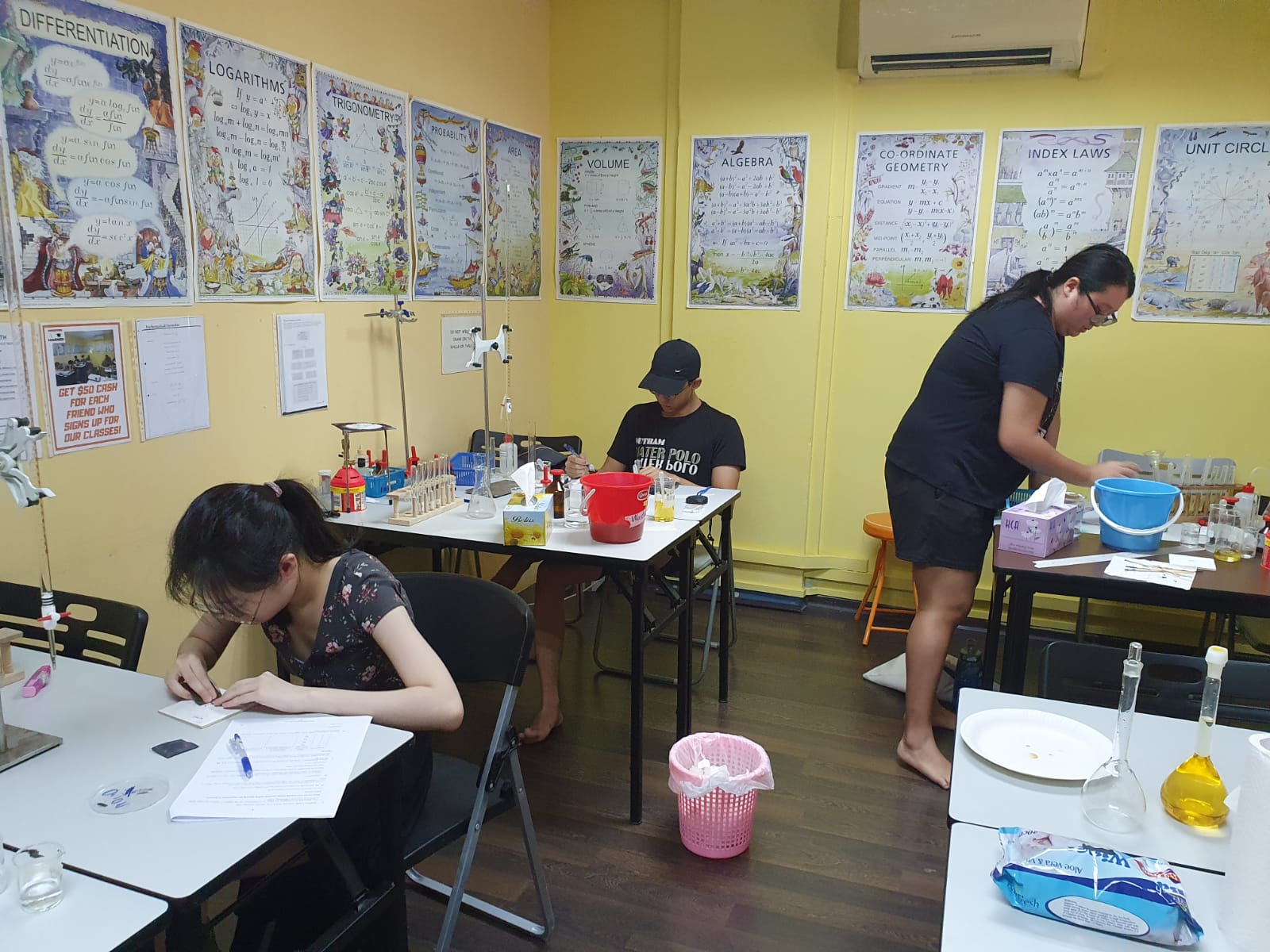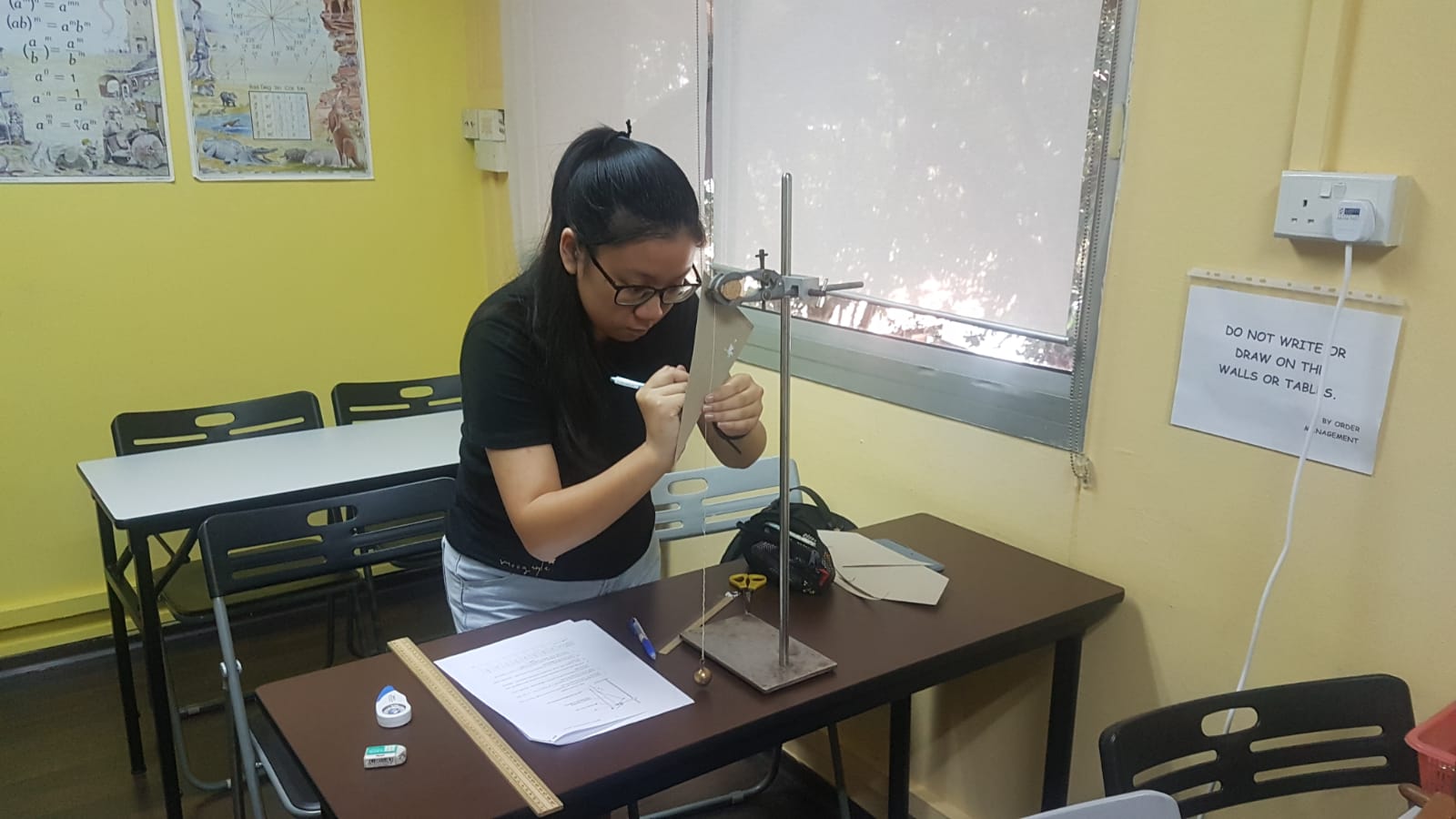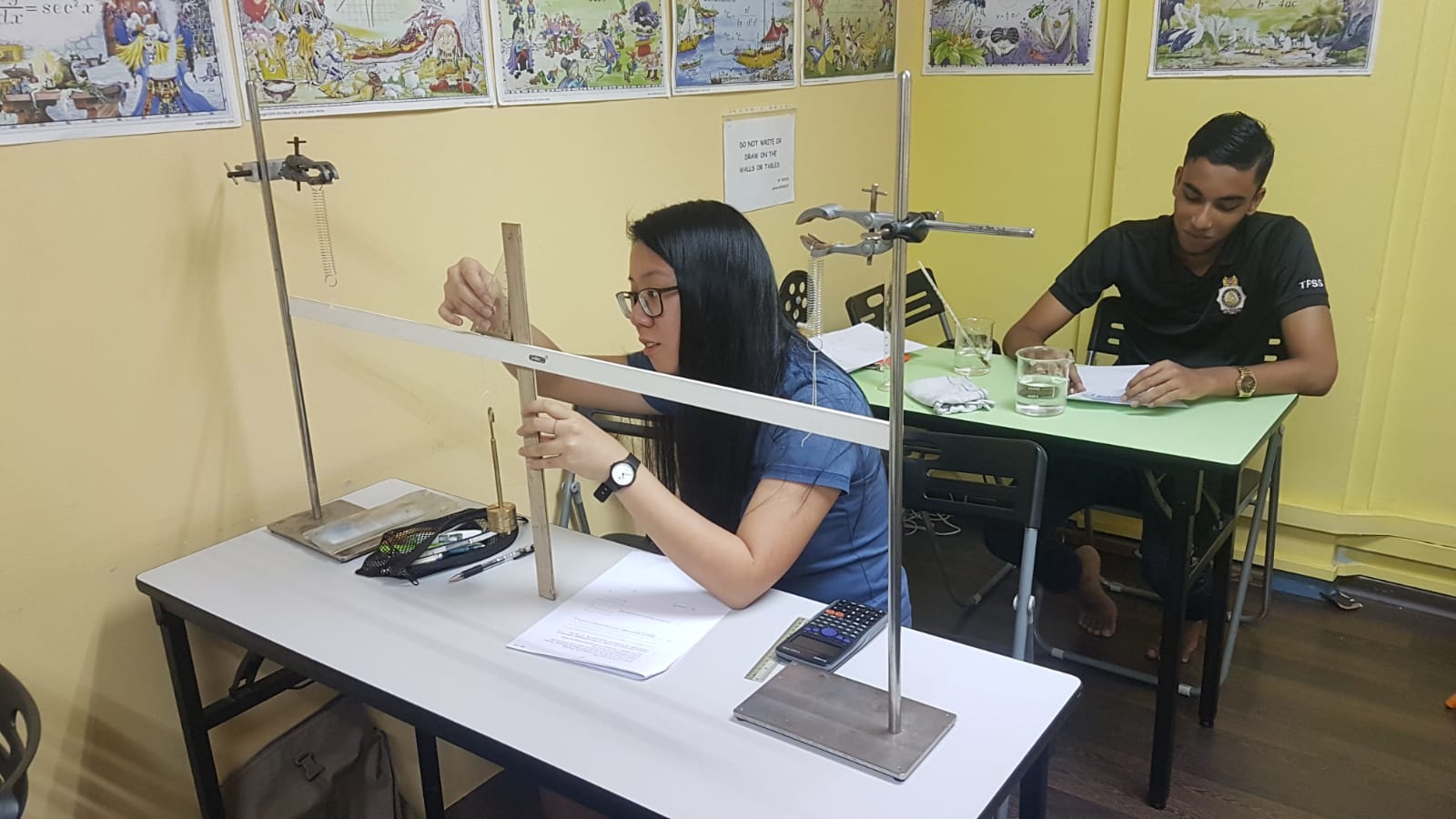Recently I tested two Sec 2 students, who are both very weak in math, on their knowledge of arithmetic involving negative numbers, and the result was what I suspected about lower sec students who are very weak in math. It reminded me of a stint I had giving math enrichment to very weak students in a secondary school. Their stories are the same – inability to handle negative numbers and negative signs in algebraic equations.
If you are in Sec 1, take the following test to see if you have acquired basic mastery of negative numbers. You PASS the test if you can answer every question correctly in not more than 8 SECONDS (yes, ONE SECOND per question). (Note: some qns may not have any negative numbers.)
(a) 5 + 3 = ____
(b) 5 – 3 = ____
(c) – 5 + 3 = ____
(d) – 5 – 3 = ____
(e) 3 + 5 = ____
(f) 3 – 5 = ____
(g) – 3 + 5 = ____
(h) – 3 – 5 = ____
Answers: (a) 8, (b) 2, (c) – 2, (d) – 8, (e) 8, (f) – 2, (g) 2, (h) – 8
If any of your answers are wrong, or you took more than 8 seconds to complete the test correctly, then you need to seriously revise and understand the concept of negative numbers, else your other topics such as algebraic simplification, expansion and factorisation will also be adversely affected. For eg, try the next one:
Simplify – 3a – [- b – (- 2a)]
Ans : b – 5a
Of course there are far harder questions. My point is, get your negative numbers in order, then you’ll see improvement in the way you solve algebraic equations. Remember, you’ll get ZERO marks for just one mistake made in the opening line of your half-page long math solution. So do not underestimate the significance of the negative sign.
The importance of Sec 2 Math and Science …
Beware the critical years in math education …
==============================================================
For our latest timetable, click here => 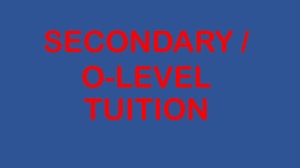
What to do if you had done badly for Math in SA1 in sec school …
Actually, sec students will normally do badly in their SA1 exams, although this should not be used by the students themselves to justify their poor performance. Why does this “mass slaughter” of math students happen near the middle of every year?
Well, my educated guesses are as follows:
(1) If you are in Sec 1, you probably did badly because of your poor or zero exposure to algebra, negative numbers and proper presentations while in primary school. Please realise that your single arrows, your poorly labelled statements and your misuse of equation signs will really worsen your grades this time. So please listen carefully to your sec school teacher’s illustrations on how math solutions are presented in major exams. Many of you would also have made careless mistakes in opening brackets with minus signs on the inside and the outside, and in simplifying or solving algebraic expressions.
(2) If you are in Sec 2, in addition to not having overcome the above problems earlier, you were probably slapped with an exam paper that was designed to “kill”. The ‘logic’ is simple. Sec 2 is a crucial year; it is the year you are “streamed”, the year that decides whether you will be allowed to do pure sciences or additional math in sec 3. So teachers feel that they need to “wake you up”, to humble you, so that you will work harder for SA2. So most exam papers for SA1 in Sec 2 have been set to “wipe out” students. It is not something I fully agree with, as such tactics can also demoralize students for life.
(3) If you are in Sec 3, it was probably because you underestimated the effort needed to master A. Math. Topics like Quadratic Functions and Logarithms need a lot of attention and deep thinking, and even ‘simple’ topics like Remainder Theorem and Partial Fractions have their difficult parts, the kinds that teachers like to select for exams. Make no mistake about this – teachers KNOW what concepts you find difficult to apply.
(4) If you are in Sec 4, the reason is the same as in (2) above, that your Math teachers want to “wake you up” before the prelims and the actual O-Level exam, and also because you wouldn’t have had enought time to revise both Sec 3 and Sec 4 work before the exam which started right after you were taught the last topic. That’s why some schools remove the mid-year exam in Sec 4, or postpone it to late June.
What you have to do now to avoid a total disaster for SA2?
(1) If you are in Sec 1, focus on mastering the solving of Algebraic Equations.
(2) If you are in Sec 2, focus on mastering the solving of equations involving Algebraic Fractions and mastering all the topics on Graphs (Linear and Quadratic Equations). If you have been taught Indices, master that too!
(3) If you are in Sec 3, for Math, focus on mastering Indices, Coordinate Geometry and Trigonometry. For A. Math, focus on mastering Trigonometry.
(4) If you are in Sec 4, for Math, focus on mastering all of Graphs and Vectors. For A. Math, focus on Applications of Differentiation and Integration. If you have no time to revise everything since Sec 1, focus on the topics mentioned in (1) to (3) above. If you have not mastered all the topics mentioned in (1) to (4) above, you will be in serious trouble if you do Math in JC.
Click on How to study for Math or Physics exams to know more about exam preparation.
Click on O-Level Math or Additional Math to know what books you can use for revision and practice.
Or consult Mr Ilyasa @ 97860411.
All the best in your exams!
TUITION CLASSES:
_______________________________________________________________
EDUCATIONAL SERVICES:
______________________________________________________________
By EX-MOE TEACHERS & EXPERIENCED TUTORS
@ BLK 644, BUKIT BATOK CENTRAL, #01-68. S(650644).
CALL 65694897 OR SMS 98530744 OR 97860411.
Integrated Programme (IP) students taking O-levels as private candidates …
Yes, as a professional teacher and tutor, I would encourage it. For two good reasons: (1) to have an internationally recognised secondary education certificate (at least a certificate beyond the PSLE; else it can be quite embarrassing), (2) to learn to prepare for a highly pressurizing major written examination.
Since IP students are not allowed to sit for the Singapore-Cambridge GCE O-Level exam (the logic of which I still do not understand), they can sit for the IGCSE exam administered by the British Council.
The IGCSE syllabus is almost the same as Singapore’s GCE O-level exam’s before 2007. In fact, it is academically less rigorous than today’s GCE O-Level although the topics covered are wider. I’ve taught both IGCSE Math and Physics as a relief teacher at UWCSEA and found them to be very manageable for students. In fact, IP students should be scoring A’s for all the IGCSE subjects if they put in enough effort in their studying.
If you need further clarification, do give me a call or sms to 97860411. Btw, I’m Ilyasa, Principal Tutor at Singapore Learner. I’m busy teaching or tutoring most of the time, so I’m sorry if I’m not able to pick up your call at times or reply promptly to your sms.
_______________________________________
TUITION CLASSES:
_______________________________________________________________
EDUCATIONAL SERVICES:
______________________________________________________________
By EX-MOE TEACHERS & EXPERIENCED TUTORS
@ BLK 644, BUKIT BATOK CENTRAL, #01-68. S(650644).
CALL 65694897 OR SMS 98530744 OR 97860411.
JC1 H2 Math reflections …
I had my first JC1 H2 Math tutee yesterday. True enough, I expect some JC1 students to start looking around for a tutor sometime in March, when most would have received their first test results at JC level.
The topics we covered were Binomial Series and APGP. Not surprisingly, the student had scored A1 for her Additional Math last year, but still struggling with beginning H2 Math topics. Didn’t I say this before, that H2 Math is significantly more difficult than A. Math? JC1 students must take their H2 Math very seriously, else I can guarantee that their Math results would mostly be S’s and U’s throughout the whole year.
For example, Binomial Series is much more difficult than the O-level Binomial Theorem. They may have the same fundamental formula, but the former has many more ‘tricks’ to look out for; ironically, it is this familiarity with the binomial expansion that deceives students into taking this topic lightly, as in the case with Inequalities. As for APGP, although it is not really very difficult, it is very new to most students who have never studied Series and Progressions before. In fact, the Summation sign itself is very alien to most new JC students.
To be good at Binomial Series and APGP, you first have to be very competent in Algebra and Indices. Additionally, you have to have this habit of writing out the first few terms and the nth term of an unfamiliar sequence or series when confronted with the difficult questions. But if you are good at being careless, you are finished.
Lastly, I have one advice for H2 Math students: Beware of the topics Vectors and Complex Numbers. : )
______________________________________________________________
For our latest timetable, click here =>
H1 Physics reflections …
Was tutoring on the topic Current Electricity just now. For this topic, students normally have difficulty in understanding the concept of internal resistance of a cell and terminal potential difference, as these concepts are not covered at the O-Levels. It is important for students to deeply understand the equation E = V + Ir, and its related graph of V against I, as well as the significance of I being zero.
If you are a H1 Physics student, you’d find that many of the topics are quite similar to the O-Level topics; so focus on understanding the new stuff, the A-level stuff, such as F = BILsin(angle), for example, and concepts such as magnetic flux density.
______________________________________________________________
For our latest timetable, click here => 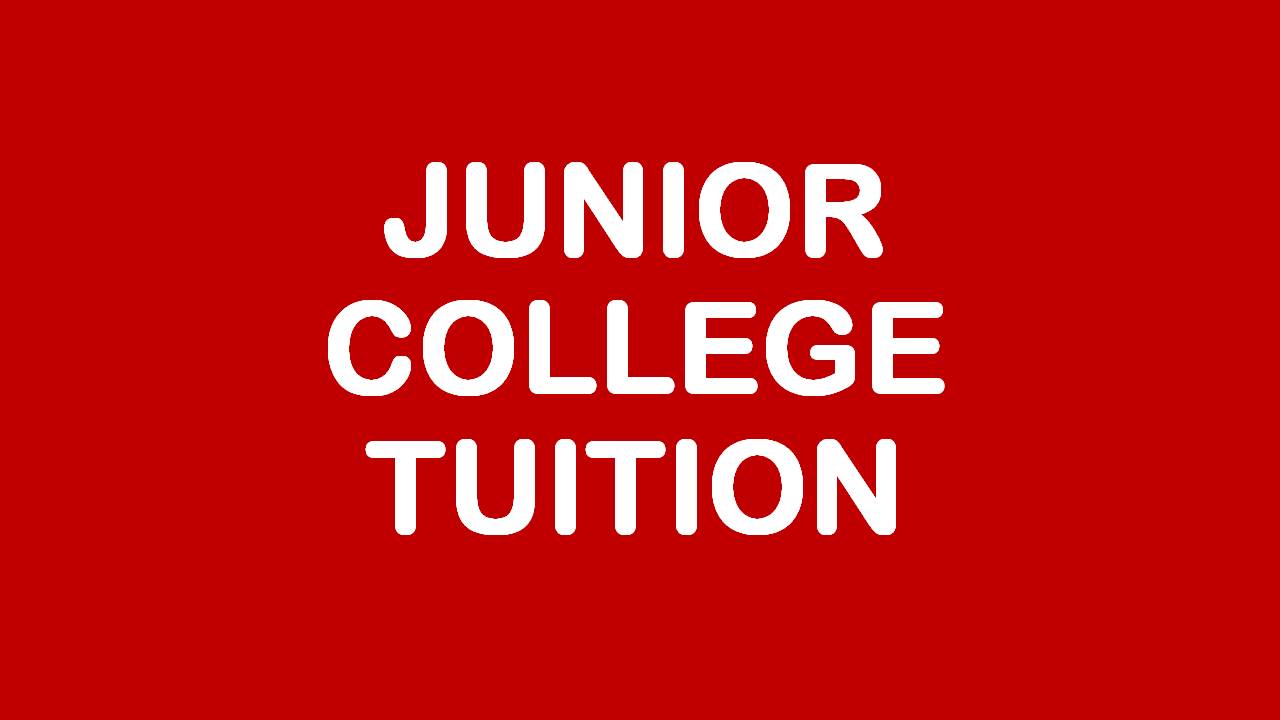
List of recognised or approved universities and educational institutes in Singapore
It’s heartbreaking to enrol in a degree or diploma course and to find out later that your degree or diploma is not recognised or cannot be used to be registered as a practicising professional in Singapore. So use the following links before you decide to apply to a particular university, college or institute:
1. List of recognised Universities and Post-secondary Institutes with campuses in Singapore
2. List of Approved Universities for Admission to the Singapore Bar
3. List of Registrable Basic Medical Qualifications for practice in Singapore
Fyi, if you spend at least 3 years studying in the campus of an overseas university that is recognised by the government of that country, the degree is also valid in Singapore for the purpose of recognising you as a degree holder. For example, if you had spent 3 or 4 years doing a degree in the University of Malaya (which is recognised by the Malaysian government), you are also considered a degree-holder if you apply to work in the Singapore Civil Service. However, restrictions apply to professional courses such as Law, Medicine and Accountancy.
Related articles:
(a) Between JC and Poly.
(b) What subject combination to choose in JC.
(c) What to do if your A Level results are bad.
_______________________________________
TUITION CLASSES:
_______________________________________________________________
EDUCATIONAL SERVICES:
______________________________________________________________
By EX-MOE TEACHERS & EXPERIENCED TUTORS
@ BLK 644, BUKIT BATOK CENTRAL, #01-68. S(650644).
CALL 65694897 OR SMS 98530744 OR 97860411.
What to do if your A-level results are bad …
It’s ok if you cried at first, because chances are, you are below 21 and legally, you are still a child. But let that be for just one day, and no more after that. The past is over. You cannot change your past, but you can still influence your future.
(1) Do not blame others. The first step in making any kind of improvement to yourself is not to blame your teachers, your tutors, your notes, your handphone etc. Blame yourself. It was YOUR show. Only YOU can fail your self and only YOU can make your self succeed.
(2) Reflect on yourself. What went wrong?
(3) Search and find your true self. What are your real interests? What is your passion?
(4) Plan your next course of action. What can you do with poor A-level results? Here are some options:
(a) Redo your A-levels. If you didn’t get an overall pass, redo it in your own JC; you’d still need the right environment and the support. If you obtained a bad pass, you will not be allowed to redo it in your JC, yet you will not be given any place in any local university. So you either self-study, get tuition, or enrol yourself in a private school like SLA or MDIS College. But re-taking A-levels will not bear fruit unless you do steps (2) and (3) above properly; if you continue your bad habits and bad strategies or you simply did not like the subjects you were taking, it’d be very hard for you to be self-disciplined and to maintain focus. You don’t get different results by doing the same things the same way over and over again (in fact, Einstein called that kind of expectation, “insanity”).
(b) Go overseas (if you have the money or get some kind of sponsorship, loan or bursary). Do the SAT and go to the US, or do a foundation year in Australia and move up.
(c) Apply to a local polytechnic to get a Diploma (but make sure you do steps (2) and (3) carefully first). With a good poly diploma, you can still get into a local university. But I think you should apply to a poly using your O-level results instead (it worked for some students before). With a poly diploma, you may even apply to be admitted directly into the 2nd or 3rd year of a recognised overseas university. REMEMBER THAT MONEY IS NOT THE MOST IMPORTANT FACTOR. IF YOU HAVE TALENT OR PROVEN ACADEMIC ABILITY, THERE WILL ALWAYS BE A SPONSOR.
(d) If you have poor A-level results but very good O-level results, you might want to apply to the NIE to become a teacher; either you will be allowed to do a degree course or you might have to become a non-graduate teacher first before moving up later. Remember that a non-graduate teacher can become a graduate teacher via the Open University Degree Programme run by SIM. But the non-graduate teacher scheme is gradually being phased out.
(e) Apply to SIM to get a Diploma in something you like. Some SIM Diplomas are sought after by employers.
(f) Apply to a private education provider like MDIS, Kaplan, Stansfield or PSB Academy to get a Diploma or if you have two A-level passes, you might still get to do a degree course. But bear in mind that these degrees or diplomas may not be recognised by the Singapore government. But if you intend to work in the private sector, it should be alright.
(g) If you are tired of studying, work for at least two years first and when you reach 21, apply to SIM University (UniSim) if you have two A-level passes. UniSim degrees are recognised in Singapore, even by our government.
(h) If you want to be an accountant, self-study for the exam conducted by the ICPAS.
(5) Take action. Strategise. Gather resources. Believe in youself and your abilities. Adopt the right values and attitude. Set your short-term and long-term goals clearly. Write these down somewhere. Be positive, and be with positive people.
You see, there are so many ways to move on. Do not let setbacks affect you too much. Pick up and join back the pieces. Get up if you are down. Don’t go anywhere near Bedok reservoir (oops!). Spend time with your loved ones instead. Remember these lines from Miley Cyrus’ song (if you don’t hate her of course):
“But I gotta keep tryin’
Gotta keep my head held high
There’s always gonna be another mountain
I’m always gonna wanna make it move
Always gonna be an uphill battle
Sometimes I’m gonna have to lose
Ain’t about how fast I get there
Ain’t about what’s waitin’ on the other side
It’s the climb.”
Do not worry about being left behind as your friends move forward. Chances are, you are going to live for another 60 years or so. When you look back someday, it wouldn’t matter that you ‘lost’ one or two years somewhere along the way. Setbacks happen to everybody; I had my fair share of failures and setbacks. How we respond to these setbacks matter.
If you still feel down, then please watch this video, http://www.youtube.com/watch?v=wOlTdkYXuzE. It might help you a bit. : )
Good luck!
Related page: A-Level Results: What to do if you get BAD or DEAD, i.e., the ‘middle class’
A-LEVEL TUITION
A-Level BIOLOGY (H1/H2) – Whatsapp 88668423 (Specialist)
A-Level CHEMISTRY (H1/H2) – Whatsapp 88668423 (Specialist)
GENERAL PAPER BONUS SESSIONS
The registration for ‘A’ and ‘O’ Level exams as a private candidate usually opens around early to mid-April (Please check SEAB website). If you are registering for a Science subject (Physics, Chemistry, Biology or Combined Sciences), at the time of registration in April, you will be asked whether you have done any science practical training in any school, centre, or institute.
Thus if you are considering Singapore Learner as your science practical training provider, you are strongly advised to register with us and begin your science practical sessions for each subject BEFORE APRIL for us to certify that you have attended basic science practical training. Thus it is recommended that you commence practical training with us in Jan/Feb. Please note students usually do about 10 practical sessions per subject to be competent in practicals.
The following is taken from SEAB website:
“If you are registering for a Science subject with a practical paper, you:
• Must have sat the same Science subject(s) previously, OR
• are currently attending or will be attending a course of instruction in Science practical at any institute/school. You must complete the course of instruction in Science practical at the institute/school enrolled in. You are required to declare that you have fulfilled the above requirements at the point of registration. Registration for the subject may be cancelled without a refund of the examination fees if a false declaration is made.“
LOOKING FOR THE BEST PLACE TO DO YOUR SCIENCE PRACTICALS? JOIN US!
We provide A-Level / H2 / IP and O-Level Physics, Chemistry, Biology and Science (Physics/Chemistry/Biology) Practical Training for private / school candidates and homeschoolers, for both local (eg. H2, Singapore-Cambridge) and international exams (CIE, IB, IGCSE).
*Enjoy great discounts on fees if your lab sessions start in February! Send a message to 88765498 for details.
*Or attend (by appointment) our SINGAPORE LEARNER OPEN HOUSE on Sat 22/2 or Sun 23/2 (both 2pm-5pm) to find out more about our Science Academy (for private candidates) or our Science Practical Training & Enrichment Programme (for all students from Primary to A-Level). Attendees will get to meet our teachers and view our Science labs and apparatus. In addition, students who sign-up on the spot will be offered our generous January fee discount scheme while others may opt to receive our $50 fee discount voucher instead (2 per practical student). To book an appointment, send a message to 88765498. Hurry, appointment slots are limited. To avoid disappointment, book now!
Our Main Practical Programmes:
A-LEVEL H2 PRACTICALS (Available Jan to Oct)
PRACTICAL CRASH COURSES (Mar, Jun, Sep and Oct)
MOCK EXAMS FOR SCIENCE PRACTICAL (Sep and Oct)
Other Practical Programmes We Provide:
CIE A-LEVEL PRACTICALS
INDIVIDUAL 1-1 PRACTICAL COACHING
Why Us?
-
Our teachers are highly qualified and very experienced, and we actually TEACH you good practical techniques.
-
We have been a one-stop comprehensive science practical centre providing solid practical training for ALL THREE sciences and for all levels and streams since 2017.
-
Our laboratory apparatus are exam-grade and the same as those used in MOE schools and our chemicals are all NEA-approved.
-
We have a structured practical training programme catering to the needs of both beginners and experienced students.
-
We have a small class size so that the teacher is able to observe the actions of each student more closely and demonstrate the correct practical techniques where and when necessary.
You may need science practical lessons if you are a private candidate who needs a science lab and apparatus as well as practical coaching, or you are a school candidate who needs more practical training to get top grades.
Singapore Learner @ Bukit Batok
Blk 644, Bukit Batok Central, #01-68. S(650644).
Tel: +(65) 6569 4897, +(65) 88765498
Email: singaporelearner@gmail.com
If you wish to visit us, kindly call or sms first. Thank you.
A-level results 2012: …mixed feelings
I was both happy and sad yesterday. One of my students obtained all A’s and another didn’t get a single A. Both were from IP schools. I tutored them in H2 Math and Physics. Both were very bright and fast learners. So what happened?
I don’t know what happened during their actual exams, but I do know that one of them adapted to secondary and jc school life and the other didn’t, with regard to studying. You see, both of them scored many A-stars at PSLE, and PSLE is one of those exams where you don’t have to study much; PSLE is almost like an olympiad test, especially for Math. But the A-levels is a different ball game altogether, where I dare say that your intelligence counts for only 20% of your marks. The rest is about how much Knowledge you have – Factual, Conceptual, Procedural, Conditional and Metacognitive. Put it simply, students who are smart but lazy can do well at the PSLE but will perform terribly at the A-levels.
IP students also have one disadvantage, compared to non-IP students. Because they skip the O-levels, IP students may not have sufficient exposure and training to do a high-stakes, content-intensive all-in-one-sitting exam like the A-levels. This may result in underestimating the time needed to have a complete revision of all the topics needed for the ultimate exam.
But IP students have the advantage of learning some A-level topics earlier than non-IP students. However, bear in mind that for a memory-intensive exam like the A-levels, learning things earlier is not always better.
Related Articles:
What to do if your A-level results are bad
_______________________________________
TUITION CLASSES:
_______________________________________________________________
EDUCATIONAL SERVICES:
______________________________________________________________
By EX-MOE TEACHERS & EXPERIENCED TUTORS
@ BLK 644, BUKIT BATOK CENTRAL, #01-68. S(650644).
CALL 65694897 OR SMS 98530744 OR 97860411.
There’s no such thing as a ‘Top’ Primary School …
Yes, there’s no such thing as a ‘top’ primary school, for the simple reason that entry into pri schools is not based on some kind of entrance exam or placement test. So not surprisingly, a student from RGPS can end up in a normal stream of a ‘neighbourhood’ sec school.
I’ve tutored weak math sec students who came from ‘brand name’ primary schs. They are no different from students who come from almost-unheard-of pri schools. In fact, even some students from IP schools are not as academically as good as those from ‘neighbourhood’ schools. The former just happen to be early bloomers.
However, there IS such a thing as a “rich-kids’ primary school”, which arises because the neighbourhood in which the sch is situated consists of mainly landed properties or condos. Well, if you are the kind who feels better only if you mix with people of the same social status as you are, then go to such schools and I wish you all the best in life.
And, there IS such a thing as a primary school with good teachers. You have to seek out such schools if your child is not an independent learner. But please bear in mind that good teachers do move around or get posted elsewhere or ironically get promoted to a non-teaching post.
A good school is one that adds value to your child.
If you think about it deeply, the notion of a ‘top school’ is problematic. Is a school that attracts top students a good school? Bear in mind that teachers in such schools may teach too fast and expect a lot from students yet do minimal teaching work. Is a school that produces good results in national exams a good school? Well, of course a sch that takes in bright students tend to produce above-average results; it’s something expected, and not something necessarily due to the extraordinary skills of the teachers or some kind of super learning programme (I studied in RI and RJC, so I can say a bit about the kinds of teachers back then).
So do all these mean that a primary school that consistently produces good PSLE results is a good school, since pri schools do not admit their pri 1 students based on results? From a pragmatic Singaporean point of view, or from a pure academic one, yes. So is there a primary school in Singapore that produces admirable PSLE results for MOST of its students year after year, and not just for its GEP students (if any)?
Please bear in mind that the primary schools with GEP students are not themselves the ones who produce the gifted students. The gifted students are first identified through a national selection test and then posted to those primary schools with GEP classes.
_______________________________________
TUITION CLASSES:
_______________________________________________________________
EDUCATIONAL SERVICES:
______________________________________________________________
By EX-MOE TEACHERS & EXPERIENCED TUTORS
@ BLK 644, BUKIT BATOK CENTRAL, #01-68. S(650644).
CALL 65694897 OR SMS 98530744 OR 97860411.
Good A. Math test result …
I’m very happy today, not just because I have no teaching and no tutoring at all on Mondays. It is because my one of my tuition students smsed me her Sec 3 A. Math common test result, for which she obtained 31/40. Not bad at all for someone who has been struggling with her Algebra and Indices since last year.
This is what I mean when I talk about hard work. You don’t have to be an overnight success story. Neither do you need to score 100/100. You just have to be persistent in your quest for improvement. It’s ok for success to come in small doses. If you stick to your goals, the Big Success will come some day.
I also tutored her two elder brothers, from sec to jc, both of whom have obtained places in our local universities. The amazing thing about them is that they were ‘average’ students from ‘neighbourhood’ schools who simply refused to give up on their studies. They did a lot of work, asked many questions along the way, and took quite a lot of flak from me for being careless and forgetful. But that’s how things go for most of us. We are not perfect people who can understand immediately what we see or hear.
My main point is: Success is a personal choice.
_______________________________________
TUITION CLASSES:
_______________________________________________________________
EDUCATIONAL SERVICES:
______________________________________________________________
